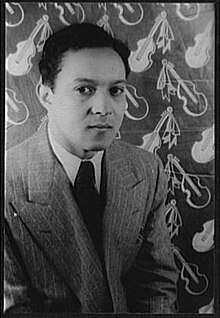Everett Lee
Everett Lee (born August 31, 1916)[1][2] is an American conductor and violinist. He was the first African American to conduct a Broadway musical, the first to "conduct an established symphony orchestra below the Mason–Dixon line", and the first to conduct a performance by a major American opera company.[3][4]
Everett Lee | |
|---|---|
 Everett Lee (1948) | |
| Born | August 31, 1916 |
| Occupation | Conductor, violinist |
Career
Born in Wheeling, West Virginia, to a middle-class family, Lee moved with his parents to Cleveland, Ohio, in 1927 as part of the Great Migration. While working as a hotel busboy as a teenager, Lee met the conductor Artur Rodziński, who became his mentor. He studied violin at the Cleveland Institute of Music, where he received a Ranney Scholarship. In 1943, Lee was asked to join the orchestra of the Broadway musical Carmen Jones, an all-black contemporary retelling of Georges Bizet's opera Carmen. Lee played violin in the pit and performed the oboe onstage in one scene; he was one of only two African-American musicians in the orchestra.[1] When Carmen Jones's conductor Joseph Lattau fell ill, Lee "got his first break as an emergency pinch-hitter."[5] Leonard Bernstein saw a performance of Carmen Jones with Lee leading the orchestra and asked him to become the permanent conductor of his musical On the Town. When Lee joined the show in September 1945, he was celebrated for being the first African American to regularly conduct a Broadway musical.[1][6]
In 1946, Lee won a Koussevitzky Music Foundation Award to conduct at Tanglewood, and played first violin in the New York City Symphony, conducted by Bernstein. In 1947, he founded an interracial orchestra, the Cosmopolitan Symphony Society, made up of "Americans of Chinese, Russian, Jewish, Negro, Italian and Slavic origin", as well as women.[1] He served as director of Columbia University's opera department in the early 1950s and traveled to Europe on a Fulbright scholarship. In 1953, Lee served as a guest conductor of the Louisville Orchestra, becoming the first African American to conduct a white symphony orchestra in the American South.[6][3] In 1955, he conducted an acclaimed New York City Opera production of La traviata, becoming "the first Negro to conduct professional grand opera in the U.S."[4][7]
Lee was met with undisguised racism throughout his career. Oscar Hammerstein II declined to hire Lee to conduct touring productions of his shows, explaining that Southern theaters would refuse to book them.[1] Concert manager Arthur Judson told Lee, "I don't believe in Negro symphony conductors."[1] Deciding that he would find better opportunities outside of America, Lee moved to Germany with his family in 1957. In 1962, he was appointed chief conductor of the Norrköping Symphony Orchestra in Sweden, a position he held for a decade. In 1976, he conducted the New York Philharmonic for the first time; the concert was in honor of Martin Luther King Jr.'s birthday and included a work by African-American composer David Baker. In 1979, he became music director of the Bogotá Philharmonic Orchestra in Colombia.
Personal life
In 1944, Lee married the accompanist and vocal coach Sylvia Olden (1917–2004).[8] The couple had two children, Everett III and Eve, and later divorced. He then married Christin in 1979, and had another son, Erik. Lee lives in Norrköping, Sweden. He turned 100 in August 2016.[2]
See also
References
- Oja, Carol J. (2013). "Everett Lee and the Racial Politics of Orchestral Conducting". American Music Review (Fall 2013). Retrieved August 14, 2016.
- Terrance McKnight (2016-08-31). "Happy 100th Birthday Everett Lee, Trailblazing Conductor". WQXR-FM. Retrieved 2016-11-03.
- Cheatham, Wallace, ed. Dialogues on Opera and the African-American Experience. Lanham: Scarecrow Press, 1997.
- "Yesterday in Negro History." Jet, 22 April 1965. 11.
- Parmenter, Ross. "The World of Music: Season's Start", The New York Times 31 August 1947.
- Pinkston, Antwon, and Paula Burba. "Black History Month: 1953 Everett Lee", Louisville Courier-Journal, 1 February 2010.
- "Everett Lee Conducts at City Center", The New York Times 18 April 1955.
- Latty, Yvonne. "Sylvia Olden Lee, 86, music-world icon", Philadelphia Daily News 16 April 2004.